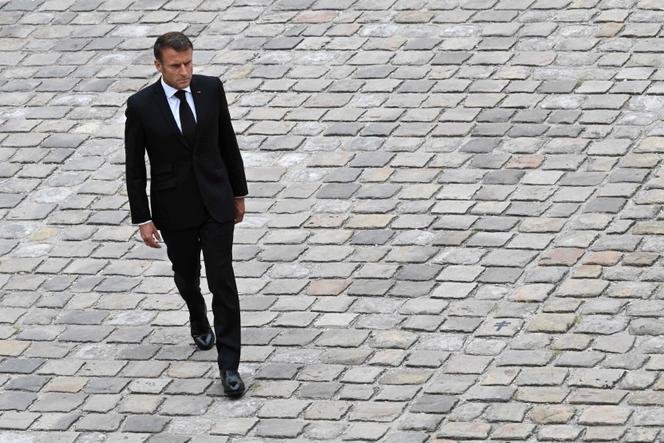


Tuesday evening at the Elysée Palace, Emmanuel Macron gathered the leaders of the governing coalition for the first act of his "major political initiative" on Wednesday, August 30. During this preparatory dinner, between the whelks, oysters and shrimps, there was much talk of a referendum – the head of state having raised the possibility in a letter sent to party leaders.
Most of the 18 guests rejected the idea, with the unexpected exception of Yaël Braun-Pivet, president of the Assemblée Nationale, who said she was in favor of a direct consultation of the French people on national service and/or assisted dying. Former prime minister Edouard Philippe and head of the centrist MoDem party François Bayrou expressed their reservations. Similarly, Richard Ferrand, former president of the Assemblée Nationale, thought it best that "the aims of the referendum do not benefit the undesired successors" of Macron. Stéphane Séjourné, head of Macron's party Renaissance, said he was opposed to any referendum before the European elections, set for June 9, 2024, which would postpone a possible consultation by more than a year. Interior Minister Gérald Darmanin deemed a referendum on immigration impossible.
With these warnings in mind, Macron will convene the leaders of the political parties represented in Parliament in the shadow of the necropolis of the kings of France, in the cloister of the former royal abbey of Saint-Denis, just north of Paris, from 3 pm on Wednesday. The venue is not "very republican," noted constitutional expert Didier Maus.
The building, which now houses the Maison d'Education de la Légion d'Honneur, was renovated in the 2010s on the initiative of General Jean-Louis Georgelin, former grand chancellor of the Legion of Honor, who died on August 18. The government is promoting the establishment as a "symbol of republican meritocracy." Created by Napoleon, "it is a school for young girls whose parents have been rewarded by the nation for particular merits," explained government spokesperson Olivier Véran. All are boarders and wear uniforms. The school is located in Saint-Denis, a city that was hard hit by the urban riots between late June and early July. More realistically, the school has the advantage of being deserted (the new school year has not yet started), close to Paris, easily accessible and easy to secure.
A few steps away from the remains of Louis XVI and Marie-Antoinette and in front of the prime minister and the three presidents of assemblies – Braun-Pivet, Gérard Larcher (Sénat), and Thierry Beaudet (Economic, Social and Environmental Council) – Macron will invite party leaders to express their views on the world's major upheavals. They will discuss "how to make public policy more effective by simplifying procedures, finding new ways of structuring regions and decentralization and proposing reforms to our institutions." They will also explore "how to ensure the cohesion of the nation, by uniting French men and women around a common republican foundation," according to the program belatedly unveiled by the Elysée Palace on Tuesday evening.
You have 62.37% of this article left to read. The rest is for subscribers only.
